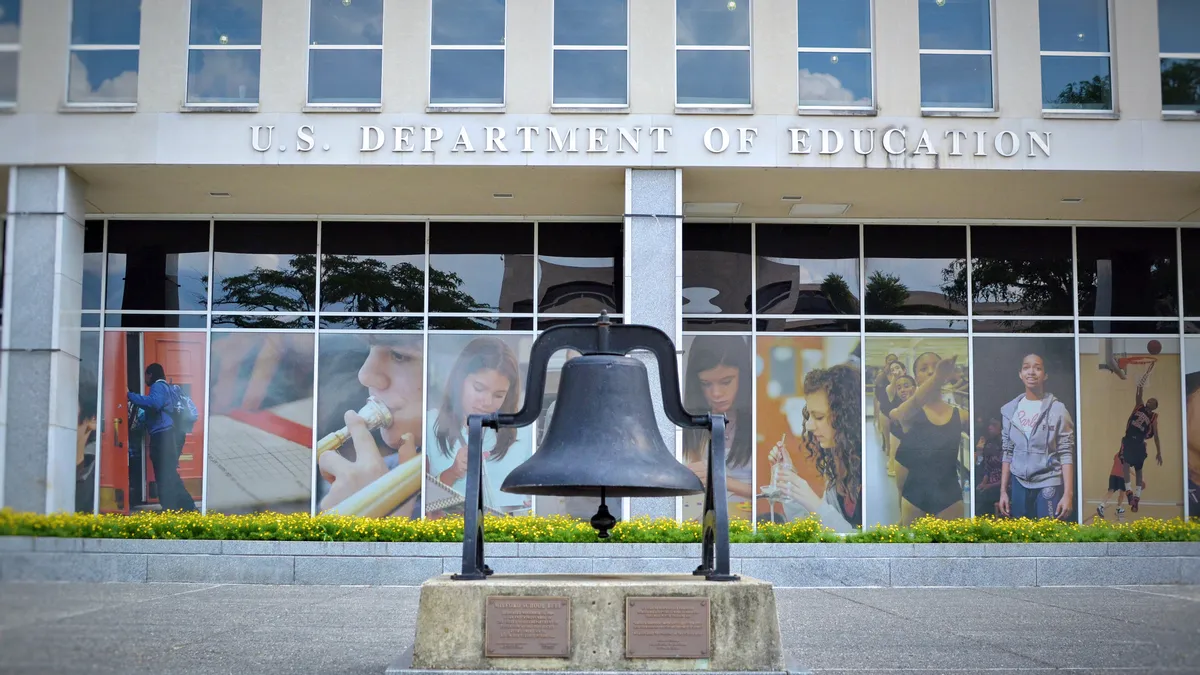The U.S. Department of Education is ending experiments that allowed participating colleges with competency-based education (CBE) programs to receive federal aid, according to an agency letter obtained by Education Dive.
Launched in 2014, the experiments waived federal aid rules for some colleges with CBE programs, which allow students to complete coursework mostly at their own pace instead of on a fixed schedule. The aim was to collect data to inform policy decisions on CBE. Inside Higher Ed first reported the Ed Department was halting the experiments.
The Ed Department notified affected colleges last month that the experimental sites initiative will end on June 30, 2020, though colleges that have active programs may be able to receive federal aid through 2021 to give students time to complete their studies.
The Ed Department's website lists more than a dozen institutions — including large universities such as Southern New Hampshire and Capella, as well as several community colleges — as participating in the experiments, though some may no longer have active CBE programs.
The agency is ending the experiments after it crafted new regulatory language that could affect CBE programs. Although the department has not yet issued final regulations, the proposed changes include a new system for disbursing federal aid for some CBE programs, according to the letter.
These new regulations were "based, in part, on what the Department learned from the CBE experiment," the agency wrote. It added that the forthcoming rules "would not have been possible" without the institutions' participation in the CBE experiments.
The colleges will no longer have waivers letting them bypass federal aid regulations for their CBE programs. One way they could access Title IV funds would be by getting approval from their accreditors and the Ed Department to operate a direct-assement program. This type of program allows students to demonstrate what they've learned through tests and other assessments rather than through time spent on a course.
Forthcoming regulations could also open the gates to federal funding.
Southern New Hampshire and Capella already have direct-assement approvals. The end of the experiments will likely have less of an impact on those schools than on those that don't have such approvals, Charla Long, executive director of the Competency-Based Education Network, told Education Dive in an email.
In a statement emailed to Education Dive, Southern New Hampshire said it was "working with the Department of Education to learn more about the decision and potential impact of the changes."
Colleges that don't yet have direct assessment approval likely wouldn't be able to get it before the experiments end next year, and some of the programs could be at risk of shutting down, Long said.
The impact of the change
Earlier this year, the Ed Department announced that it reached consensus with representatives for students, colleges and state regulators over new rules governing online education and accreditation. So far, the department has released only part of the final regulations.
The agreed-upon language includes changes that could make it easier to operate subscription-based CBE programs, which allow students to move through classes at their own pace and pay for them at fixed intervals. The regulations also could simplify the approval process for direct-assessment programs.
However, some of the experimental CBE programs may lose students who rely on federal aid to participate in them. Salt Lake Community College (SLCC), for example, received a waiver that allowed roughly 100 students to receive Title IV funds for some of its CBE programs last year.
Now that the experimental sites initiative is ending, SLCC may have to look to state funding to support some of the students who need financial assistance to enroll in its CBE programs, Eric Heiser, the outgoing dean of the college's School of Applied Technology and Technical Specialities, told Education Dive in an interview.
"We're going to do everything we can to make sure the action by (the Ed Department) does not affect any of our students," Heiser said.
At Capella University, only eight students were covered under the experiments, Jillian Klein, senior vice president of government affairs at Capella's parent company, Strategic Education Inc., told Education Dive in an email. Officials don't expect the experiments' end to impact their CBE offerings.
"We are hopeful that the forthcoming regulatory changes from the Accreditation and Innovation negotiated rulemaking sessions will provide a long term solution for many of the waivers that were included in these experiments," Klein said.
Although many colleges are interested in CBE, few have launched large-scale programs aside from a handful of big online-focused universities, such as Western Governors and Southern New Hampshire.
One of the biggest barriers to setting up CBE programs is the current system governing federal aid, according to a recent survey from the American Institutes for Research and Eduventures Research.
Title IV funding is generally awarded based on the credit hour, a time-based unit that the Ed Department uses as a proxy for measuring how much a student has learned. CBE programs, however, aren't time-based, which can make it hard to align funding.
To receive aid, colleges can map their programs to the credit hour or seek approval from the Ed Department to receive federal aid for direct-assessment programs. However, it can be hard to predict when the agency will give an institution the green light.
The forthcoming regulations may make it easier to get approvals for direct-assessment programs, but they're still unlikely to cause a "rising tide" of CBE programs, said Howard Lurie, principal analyst for online and continuing education at Eduventures.
Colleges in the AIR/Eduventures survey that have or are in the process of adding CBE programs said they have faced other hurdles, including high start-up costs, competing institutional priorities and a lack of faculty support.
"Even if you had a clear pathway from the (Ed Department) on access to more federal aid … you still have institutional obstacles," Lurie said.























